London Film Festival 2019: Days 8 – 10: Devastating Dramas & Dark Comedies
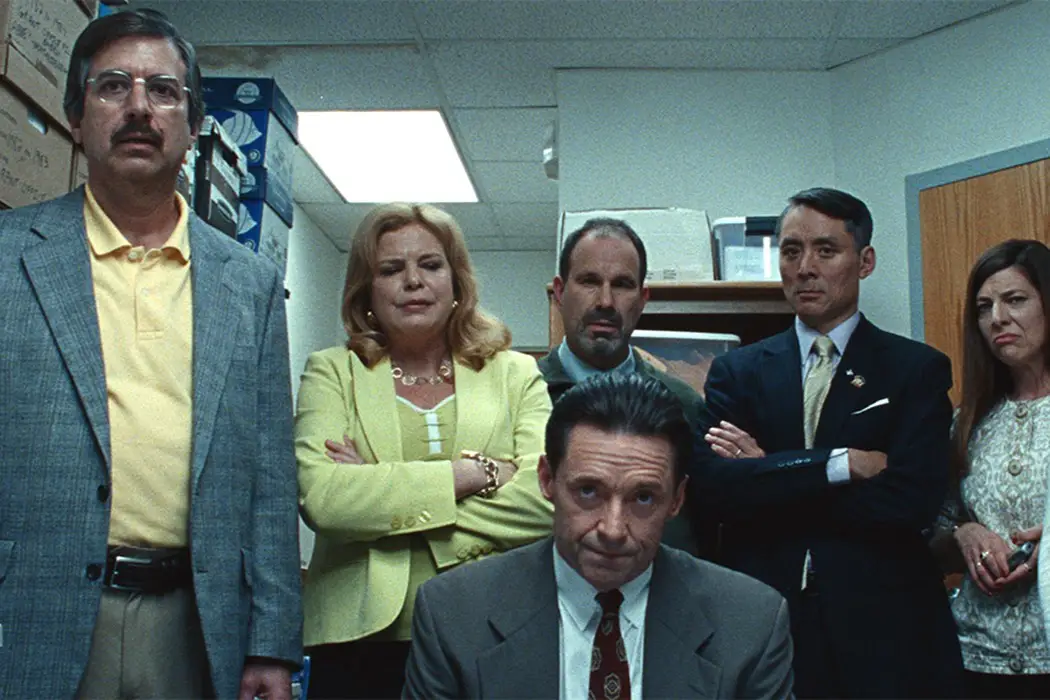
Alistair is a 25 year old writer based in Cambridge.…
By the time you’re reading this, 2019’s London Film Festival will be over, with the final few days offering big gala premieres of A Beautiful Day in the Neighbourhood and the closing film, Martin Scorsese‘s hotly anticipated The Irishman. There will be more LFF coverage from the team later this week – but for now, here’s some more of what we’ve caught up with in the last few days.
Adoration (Fabrice du Welz)
Maria Lattila: Mental health is a big issue in mainstream cinema now, especially with Todd Phillips’ Joker making the rounds in cinemas, albeit with a less than positive portrayal of a mentally ill loner as a psychopath of epic proportions. Fabrice du Welz’s film Adoration tackles mental illness through the eyes of a 12-year-old Paul who befriends Gloria, a charismatic and fun girl with an unspecified mental illness.
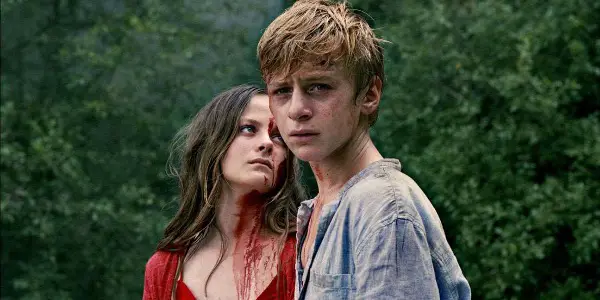
Paul’s mother works in a clinic where Gloria is admitted and despite being told not to, Paul befriends Gloria. The film becomes a dark fairy-tale once Gloria and Paul escape the clinic and set to find Gloria’s uncle who supposedly lives in Brittany. It’s a grand adventure for the two younglings, full of mischief and play, but things take a turn when Gloria’s delusions and erratic nature become apparent.
Adoration is constantly a fascinating and interesting film, but fails to bring anything new to the screen. It doesn’t lean on its fairytale vibe enough to become truly engaging. Both of the child actors are mesmerising on screen, especially Fantine Harduin as Gloria. She is furious, loving and desperate, often in the same scene. Gloria is never a victim per se, but an active agent in her own story, just one that’s mind is broken, leading her to make terrible decisions on a whim.
Thomas Gioria, who impressed in Custody, brings much needed vulnerability and pathos to his role as the naïve Paul. We see everything through his eyes and the world according to Paul is a wondrous place, full of life and little miracles. His loss of innocence during the pair’s journey is tragic. Fabrice du Welz has crafted a visually arresting and magical film that never quite reaches its full potential but serves as a neat little film in its own right.
Bad Education (Cory Finley)
Nathan Osborne: Sophomore slump? What sophomore slump? Cory Finley’s layered second feature is a bitingly funny and sharply pointed movie that delivers on the promise he exhibited in his directorial debut Thoroughbreds – and then some.
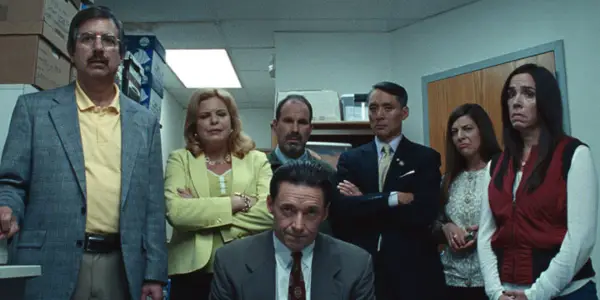
Inspired by the biggest theft ever recorded in the American school system, Bad Education uses a small town event as a clever vessel to parallel the bigger, wider and socially-relevant issues of today. Written by Mike Makowsky in a screenplay teaming with moral ambiguity, tightly-crafted humour and genuine surprise, Bad Education’s incredible astute cautionary tale of corruption and authority is as throughly entertaining as it is bleakly recognisable. Finley’s extraordinary ability to balance the screenplay’s tones is an impressive feat in itself: hilarious one minute and bitting the next, he tinges it with a melancholy sadness as the contemporary resonance become clearer. His camera moves precisely, a measured piece of filmmaking that figuratively and literally lines everything up in its cross-hares so there’s no mistaking the target by the conclusion. It doesn’t quite know when and where to call it a day, stuttering out a little towards the end, but we’re nitpicking here – on the whole, it’s staggeringly sophisticated.
Hugh Jackman delivers a career-best performance as Frank Tassone: relying on his natural charisma while hiding something deceitful underneath, Jackman so skilfully calibrates a tricky character that could have fallen to pieces in the wrong hands. Jackman is perfect casting, as is the fabulously snarky Allison Janney: as reliably hilarious as ever, she can just as convincingly sell the darker dramatics of her role. Matched tremendously, the duo cultivate a chemistry that cements the pair as one of the most surprising and dynamic combinations of the year: award consideration for either would be earned and deserved.
Pay attention to the darkly funny, sadly relevant and morally blurred Bad Education, which proves Cory Finley to be one of the most exciting new directors. It’s a winning grade from me.
Divine Love (Gabriel Mascaro)
Alistair Ryder: Divine Love was written and filmed prior to the election of far right Brazilian president Jair Bolsonaro, but its vision of a near-future Brazil where warped religious values have replaced the country’s secular status has given it a newfound prescience since premiering on the festival circuit. Writer/director Gabriel Mascaro’s film isn’t as ridiculous as it appears; the idea of carnival being replaced by a religious festival as Brazil’s biggest national celebration, or a bureaucratic agency designed to stop couples from separating, feel like depressing inevitabilities under Bolsonaro’s supposedly religious tenure. But for all its tangible glimpses into a near future dictated by the religious right, the dystopian world building can’t make up for an unfocused character study at the centre.

Dira Paes stars as Joana, a deeply religious woman who works at a Government’s “births, marriages and deaths” agency, doing all she can to make it difficult for couples who wish to separate. She’s struggling to conceive a child with her husband, so the pair frequently attend a religious group called Divine Love, which preaches religious values, but really is nothing more than a weekly swinger’s party with a supposedly evangelical bent. Joana finally gets pregnant – but then has a crisis of faith, when she discovers that the baby’s father is neither her partner or anybody at the group. Could it really be a gift from God?
Mascaro frequently seems more interested in the excesses of this world, the salacious private lives of the openly religious, than in developing a character drama worth investing in. We repeatedly see the Divine Love “ceremonies” (ie: extensive sequences of group sex), and some of the more ridiculous extents the couple go through to get pregnant – such as hanging upside down and pointing a UV light at the penis, in order to generate testosterone.
But spending so much time on the decadence means that it comes at the expense of a richly drawn character drama. Mascaro is having so much fun exploring this world, and the hypocrisy of the most religious figures within, that the moral dilemma facing its protagonist feels like an afterthought. The end product is admirable for its glimpses into an eerily believable dystopian future, but when the central storyline is as unfocused as it is here, it’s certainly less than divine.
La Llorona (Jayro Bustamante)
Maria Lattila: La Llorona has one of the most hypnotising first scenes. A family chanting, while holding hands, as if to pray away the bad forces. The entire of runtime of Jayro Bustamante’s film is full of similar, visually striking moments even if they don’t all come together quite as tightly as you’d wish.
The film then jumps to an elderly general’s trial where it is to be decided whether he is guilty of a whole genocide or not. A moving testimony from a native woman is eerily similar to the trials on our own TV screens, describing the violation of not just one woman but an entire tribe. The general is eventually acquitted, but he begins to hear voices inside the house and the family’s support for him is fading. And what about the new housemaid, Alma?
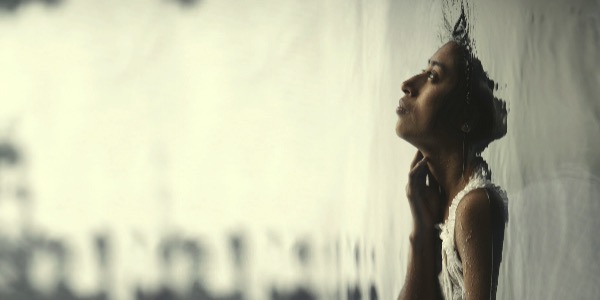
La Llorona, which bears a similar name to a much lesser Hollywood horror, is a compelling piece of cinema; it’s at once painfully timely and reflective of history. Bustamante blends drama and horror with ease and while there may not be many scares, the film is quietly shocking and affecting. There are plenty of beautiful shots in the film, which at times feels like a collage of these rather than a visually coherent story, but the film is narratively strong enough to withstand this.
Part ghost-story, part MeToo-era drama, La Llorona is a film that runs on director Bustamante’s unique voice and the ability to mix genres for the narrative’s benefit. It’s a singular piece of filmmaking, one that deals with the ugly and painful history of Guatemala in a new, fresh way.
Lingua Franca (Isabel Sandoval)
Nathan Osborne: Lingua Franca is quite a revolutionary feature really, but the film’s understated nature wouldn’t let you in on that.
Isabel Sandoval, who writes, directs, produces, edits and stars, is the first trans woman of colour to write and direct a feature like this. In her first film since her transition, Sandoval‘s heartfelt approach – informed by her own experiences – brings such tenderness and poignancy to the project. In her direction and especially aspects of the writing, Sandoval imbues the piece with an authenticity so seldom seen on screen and often missing even in LGBTQ+ filmmaking, resulting in an important and brilliantly humanistic piece.

Where Lingua Franca shines in its character work, with the relationship at its heart providing the full scope of rarely-explored ground. When Olivia and Alex are together, the film really benefits from their dynamic but it gets off to a slow start and doesn’t always place focus on the right person; Alex is not nearly as fascinating a character as Olivia despite the narrative leaning towards him as an audience surrogate and tether. It may be down to Sandoval being slightly more limited in her acting range than Eamon Farren, who impressed in his complexity, but it does seem slightly out of focus and misjudged. The narrative itself is a little less successful, falling back on indie cliches, but textured by hot topics such as human rights and immigration, those issues are again alleviated by the script’s compassion.
Lingua Franca can’t resist an indie cliche but the insight brought by the multi-talented Isabel Sandoval helps this endearing effort overcome those flaws.
The Painted Bird (Václav Marhoul)
Musanna Ahmed: I was convinced that I wouldn’t see anything more disturbing than Jennifer Kent’s The Nightingale, considering its unflinching look at colonialist brutality, however The Painted Bird might have it beat. This is a three-hour nightmare that I couldn’t wake up from – a thoroughly absorbing character study achieved through astonishing formalism.
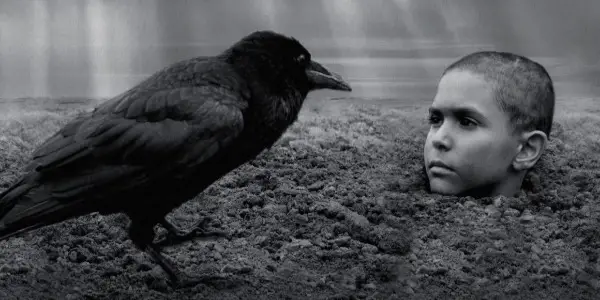
Czech director Václav Marhoul writes and directs this adaptation of Jerzy Kosiński‘s novel of the same name (oddly enough, the same author wrote Being There) that follows Joska (Petr Kotlár) a Jewish boy trekking through Eastern Europe in pursuit of his parents after being separated from them to avoid antisemitic persecution. The only care he initially has is his aunt, who unexpectedly dies at the outset. The young actor gives a startling Bressonian performance of a child visibly concealing the physical and emotional pain he endures along the way.
Along the way, Joska meets an eclectic cast of characters, his engagements bookended by named titles for the novelistic effect of devoting each chapter to a different encounter. These individuals alternate between desiring to protect him or forcing him to serve them, often in inhumane ways. More often than not, his Jewishness leads to torture, from hanging by his hands as a vicious dog tries leaping up to bite him to being buried until his neck, where a flock of crows peck on his head. Many of these induce full-body cringes – you’ve been warned.
Amongst the sympathetic resistance fighters and SS officers, there’s an insane wife-beater played by Udo Kier, a kind priest embodied by Harvey Keitel, and a deadly sniper who teaches Joska how to shoot, portrayed by Barry Pepper (the American actors impressively commit to entirely speaking the Interslavic language). How the film avoids feeling like a bunch of stories collated together is by showing a real evolution in Joska, who learns how to survive in this incredibly dangerous world and understand his identity, the latter of which impels a real poignancy in the final act.
A largely miserablist experience, The Painted Bird is essentially Come and See if it was directed by Lars Von Trier, but more delicate with fixed photography. Cinematographer Vladimír Smutný shoots with rigour, masterfully composing the black-and-white photography from stilled positions to capture striking landscapes and Nazi barbarity with blunt force. It’s hardly a salient idea to be so matter-of-fact with the violence, given we know the horrors of the Holocaust, but it works to underpin a powerful story of resistance.
Rocks (Sarah Gavron)
Maria Lattila: Rocks follows the titular Rocks, who lives on an estate in London. Her biggest worries at the beginning of the film are makeup and her friends, but this soon changes when her mentally unstable mother abandons Rocks and her little brother Emmanuel. Trying to dodge visits from social services, while keeping the lights on and food on the table with the little money her mother left for her, Rocks finds herself struggling to cope and sets out on the run with Emmanuel. They camp with friends or the occasional hotel, but it’s a situation no child should ever be.
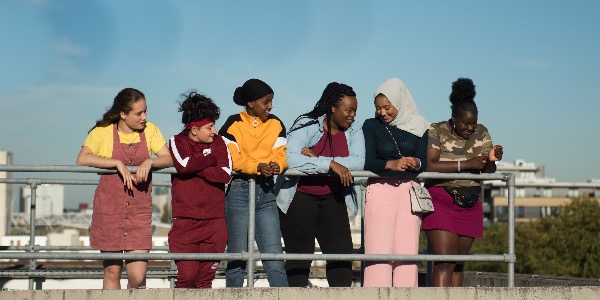
Sarah Gavron, whose previous feature was Suffragette, now turns her gaze towards something much more modern. There’s nothing wrong with a good period drama, especially if its concerns women’s rights, but Rocks is simply so full of life it’s hard not be swept away by its beats.
Bukky Bakray is simply remarkable as Rocks, a child who is forced to take on much more responsibility than she ever should. There’s not a false note in her performance and she injects Rocks with a lot of relatable awkwardness and shyness. Kosar Ali is fantastic as Rocks’ best friend Sumaya. Scenes set in her house, a packed Somalian household, are a high point in the film; they’re filled with so much love and warmth but also offer a peek into the trials and difficulties of friendship.
Gavron directs the film with a firm hand, without ever resorting to melodrama or victimising. Young D’Angelou Osei Kissiedu steals almost all of his scenes as Emmanuel, providing the film some humour amidst all the misery. Rocks is a film worth going out of your way for.
Vivarium (Lorcan Finnegan)
Alistair Ryder: Pitched somewhere between a particularly creepy episode of Inside No.9 and the episode of It’s Always Sunny in Philadelphia where Mac and Dennis move to the suburbs, Vivarium is a strange (and understandably divisive) horror satire about the current state of the housing market, and the rising costs of residential properties. Finnegan has previously stated the idea stemmed from seeing numerous upmarket housing developments appear around Dublin, most of which remained empty due to the steep asking prices. But the masterstroke of Vivarium is how it doesn’t prioritise making any social commentary, prioritising a sinister surrealism reminiscent of Yorgos Lanthimos as it explores the idea of being trapped in an empty neighbourhood for eternity.
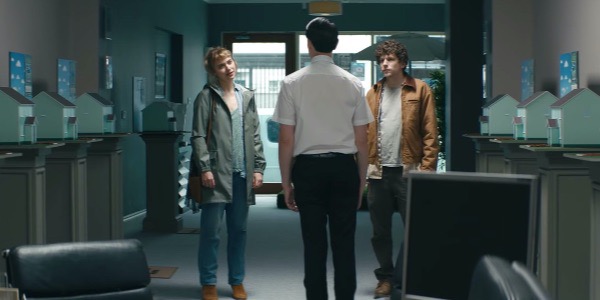
Gemma (Imogen Poots) and Tom (Jesse Eisenberg) are a young couple searching for their first home together. A meeting with a strange estate agent (Jonathan Aris) leads them to a new and entirely unoccupied development described as being just close enough, yet just far away from the city – but when they get there, they are stranded, and soon discover they are unable to leave the deserted neighbourhood. Soon, boxes with supplies start arriving at their new “forever home”, followed by a box featuring a newborn baby the couple have to raise successfully in order to leave.
Admittedly, Vivarium does run out of steam midway through, as a development early in the second act makes the eventual destination of the narrative all too obvious. It’s only a whisker over 90 minutes, but you can feel Finnegan dragging his heels to prolong this eventual reveal, that a similarly themed Twilight Zone (or Inside No.9, in this case) would be able to satisfyingly conclude in 30. By the time we reach the third act, where the paranoia is at its most heightened and the most surreal imagery of a suburban hellscape is let loose, the film may remain entertaining, but it does feel like a winning idea for a short film unnecessarily prolonged, with much of its bite softened by being bumped up to feature length.
Vivarium is a delightfully strange satire. It lacks the wealth of ideas that it needs in order to sustain interest for the full running time, but is a deliciously dark comedy regardless.
More London Film Festival reviews will be coming to Film Inquiry later this week.
Does content like this matter to you?
Become a Member and support film journalism. Unlock access to all of Film Inquiry`s great articles. Join a community of like-minded readers who are passionate about cinema - get access to our private members Network, give back to independent filmmakers, and more.
Alistair is a 25 year old writer based in Cambridge. He has been writing about film since the start of 2014, and in addition to Film Inquiry, regularly contributes to Gay Essential and The Digital Fix, with additional bylines in Film Stories, the BFI and Vague Visages. Because of his work for Film Inquiry, he is a recognised member of GALECA, the Gay & Lesbian Entertainment Critics' Association.













